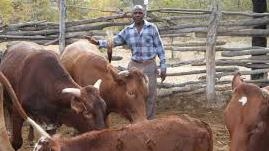Cattle is new currency amid crippling inflation in Zimbabwe
Many trying to acquire cattle in face of latest inflation numbers
 Photo credit: FAO
Photo credit: FAO
MBERENGWA, Zimbabwe
Thirty years ago, 64-year-old Benito Zhou, a communal farmer in the Mberengwa district in Zimbabwe’s Midlands Province, started investing in cattle even as the animals were dying due to a menacing drought.
In 1992, Zimbabwe was hit by a drought that decimated more than 1 million cattle and left an excess of 5 million people in need of food aid.
Inflation shot to 42% and for Zhou, it was not a good signal for the nation’s currency.
That same year, Zhou said he was retrenched from his job as a teacher and used his retrenchment package to acquire cattle.
Inflation
“I wanted to evade inflation which was affecting our local currency. I was buying the cattle cheaply because there was a drought and then feeding them with maize to keep them alive during the drought,” Zhou told Anadolu Agency.
Zimbabwe’s inflation stands at 257%, up from 192% in June, according to the Zimbabwe National Statistics Agency.
Many have been forced to acquire more cattle in the face of the latest inflation numbers.
Zimbabweans are using cattle as a store of value as the currency gets chewed up by inflation.
The UN’s Food and Agriculture Organization has been on record as saying livestock accounts for between 35% to 38% of the nation’s GDP.
As such, for many like Zhou, faced with a collapsing Zimbabwean dollar, cattle seem to have become a more stable currency than the local currency.
Scramble
Zimbabweans are scrambling to buy cattle to store the value of their wealth amid a collapsing currency fanned by galloping inflation.
Zhou has invested in cattle before and he knows what it means.
On average, one cow costs between $250 and $300 in Zimbabwe and agricultural experts here said cattle always gain value for as long as they are well fed.
“One won’t go wrong by investing in cattle because as long as they are well looked after and fed, they keep gaining value and that means more profits for anyone who invests in them,” Landiwe Musoni, an agricultural extension officer based in Masvingo, Zimbabwe’s oldest town in the south, told Anadolu Agency.
Even city dwellers like Jimayi Kuzungu, 46, are scrambling to villages where he claimed cattle are sold at reasonably lower prices.
That has made life easier for Kuzungu and other Zimbabweans switching to cattle as a new currency.
“I can’t keep my earnings which come in local currency because I fear inflation will wipe them out and so I just go to the villages to buy cattle each time I get my wages,” said Kuzungu, who worked as a nurse in the nation’s capital, Harare.
Cattle safer
Kuzungu is banking on cattle as inflation sours, which many are considering safer than putting money in banks.
“Having cows that you sell when a need arises has turned out to be a very safe financial alternative for people like myself here because we try to dribble past inflation using the cows,” he said.
In the past few years, with growing deficits of cash at local banks amidst hyperinflation, Zimbabweans have been losing confidence in the banking system.
Switching to cattle as a readily available currency has turned out to be a panacea.
With cattle, people only sell them in US dollars when a need arises and that has meant cattle have been a better value than the Zimbabwean currency, said Musoni.
Pensioners, who for the last two decades have lost their savings in banks owing to inflation, have found cattle as the answer to their plight, according to the Zimbabwe Older Persons Organization.
“It’s making sense for elderly persons who have opted to invest their pension savings in cattle because they can afford to look after themselves anytime using funds drawn from selling their cattle if they have need,” Jonathan Mandaza, the group’s head, told Anadolu Agency.
Cattle banks
As interest in cattle as a neo-currency in Zimbabwe grows, entrepreneurial Zimbabweans have formed cattle banks, where investment in cattle has become a sensation.
At an emerging cattle bank, a unit trust investment vehicle has been established where citizens can invest in cattle using the local currency, according to Ted Edwards, CEO of Silverback Asset Managers.
In this case, when a cow produces offspring, the value of the calf is added to the client's portfolio, meaning an increase in worth for the cattle investor.
"When the calves are produced by each cow invested in, that is the interest and immediate profit one has, which explains why cattle are better banks than ordinary banks that erode savings by inflation,” said Thembani Gwendo, 42, a jobless holder of an economics degree in Harare.
Anadolu Agency website contains only a portion of the news stories offered to subscribers in the AA News Broadcasting System (HAS), and in summarized form. Please contact us for subscription options.

